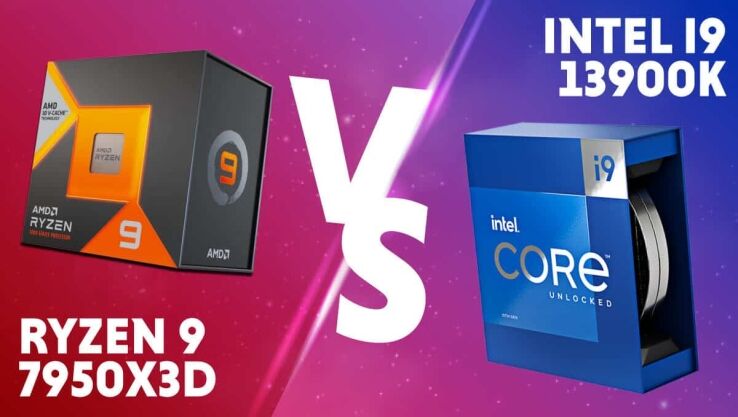Ryzen 9 7950X3D vs i9-13900K
Ryzen 9 7950X3D vs i9-13900K, which is better?

WePC is reader-supported. When you buy through links on our site, we may earn an affiliate commission. Prices subject to change. Learn more
AMD’s flagship X3D processor, the Ryzen 9 7950X3D, is finally out and available for purchase. Let’s compare it to Intel’s top option, the Core i9-13900K. A comparison between the two of these powerhouses has been long overdue. This is the battle of the giants: Ryzen 9 7950X3D vs. i9-13900K
Now read: Is Ryzen 7000X3D worth it
Ryzen 9 7950X3D vs i9-13900K: CPU specs
Here are the official specs for both processors.
Ryzen 9 7950X3D
- Core count: 16
- Thread count: 32
- Base clock: 4.2GHz
- Boost clock: 5.7GHz
- L2 cache: 16MB – 1MB per core
- L3 cache: 128MB
- TDP: 120 watts
- iGPU: Radeon Graphics
- Socket: AM5
Intel Core i9-13900K
- P-cores: 8 (Hyperthreading enabled)
- E-cores: 16
- Thread count: 32
- P-core clock speed: 3.0 / 5.8 GHz
- E-core clock speed: 2.2 / 4.3 GHz
- L2 cache: 32MB
- L3 cache: 36MB
- Base TDP: 125W
- Max TDP: 253W
- iGPU: UHD770
- Socket: LGA1700
What are the differences?
Both the 7950X3D and i9-13900K are flagship-grade processors with a thread count of 32. The 13900K does have more physical cores, but half of the cores it does have are smaller efficiency cores which offsets the potential difference in multicore performance having extra cores would have otherwise caused.
We see that the processors have a nearly identical clock speed – 5.7GHz vs. 5.8.
But we also see a very stark difference in the cache size. The Core i9-13900K has a respectable 36MB of L3 cache.
The new R9 7950X3D, on the other hand, boasts a massive 128MBs of L3 cache, which is four times as much. Surely such a remarkable difference in cache size will amount to something, right? (Spoiler: it does).
Ryzen 9 7950X3D and i9-13900K compared
Here we examine how the two processors differ in terms of performance in gaming and productivity. We also discuss power efficiency and other useful metrics.
Gaming performance
The single biggest reason to go for an X3D processor over a standard X processor is the boost in gaming performance you get. The extra L3 cache yields massive performance gains in terms of in-game FPS.
The Ryzen 9 7950X3D has successfully snagged the little of the best desktop gaming processor. It offers noticeably better gaming performance than Intel’s flagships, the 13900K and KS.
The 7950X3D offers higher FPS despite having lower single-threaded performance, so we know the 3D V-cache is doing its job well.
The performance gap varies from game to game, as some titles prefer the higher single-threaded performance, whereas others prefer the increased cache size. But the average does come out in favor of the Ryzen 9 7950X3D.
It is possible to bridge the gap with extensive overclocking on the 13900K, which is an unlocked “K” edition chip. However, overclocking this particular CPU is a tall order because of its extreme power consumption and heat generation at stock values. The 7950X3D can’t be overclocked via official means.
Workstation productivity
For workstation productivity, sticking with the 13900K is still your best bet. The workloads you would typically carry out on a productivity-focused workstation don’t particularly benefit from the extra V-cache of the X3D processors.
Consequently, workstation productivity boils down to the other base specs, namely the core count, thread count, and clock speed. The 13900K has the edge in those numbers.
Power usage and thermals
The 13900K is much more power-hungry than the 7950X3D. The former has a max TDP of 253 watts, whereas the latter has one of 120 watts. Actual power consumption differs somewhat, but these figures give us a good general idea of how their power consumption differs.
The 13900K consumes more power and generates more heat. The 7950X3D can be cooled by a decent air cooler, whereas the 13900K demands an expensive AIO for its temperatures to be kept under control.
This can end up making a noticeable difference in the final build cost.
The 13900K does feature compatibility with older hardware which can compensate for the more expensive cooler. But it wouldn’t make the most sense to go with older, suboptimal hardware for a $600 flagship processor.
Final words
To summarize, the 7950X3D is the better gaming processor, especially in games that utilize the extra cache very well. The 13900K rarely ever comes out ahead in gaming, and when it does, it usually doesn’t do so by an appreciable margin.
The 13900K is still the better processor for productivity, as the V-cache enhancement doesn’t do much for the 7950X3D in typical multithreaded workloads.